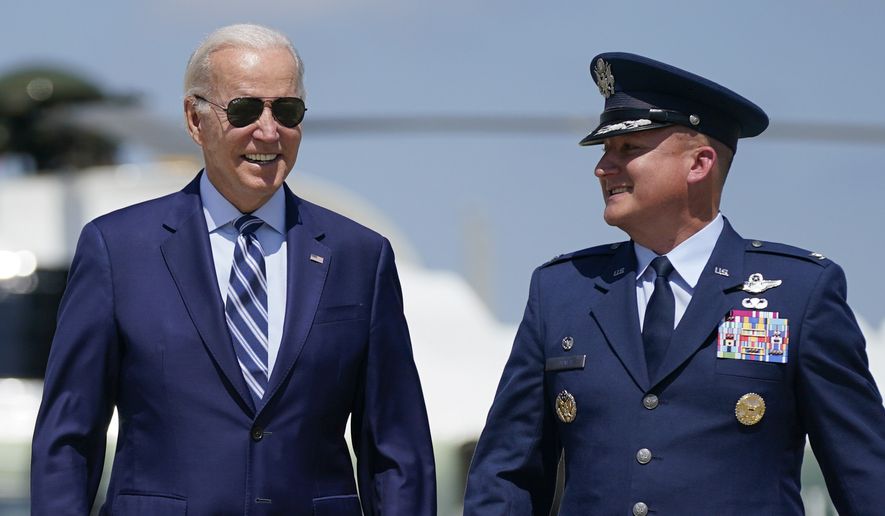President Biden is planning to ask Congress to approve a $1.1 billion arms sale to Taiwan, according to reports, as tensions between the U.S. and China surge in the wake of House Speaker Nancy Pelosi’s visit to Taipei earlier this month.
Details of the proposed sale come in the wake of transit by U.S. warships through the Taiwan Strait on Sunday. It was the first such move since Beijing commenced a series of highly provocative military exercises in the waters surrounding Taiwan in response to Mrs. Pelosi’s brief visit to the self-governing island 100 miles off of China’s mainland.
The expected package, which includes 60 anti-ship missiles totaling $355 million, 100 air-to-air missiles totaling $85.6 million and a $655.4 million contract extension for surveillance radar, was first reported by Politico, which cited sources with direct knowledge of the proposal.
The White House has yet to publicly confirm the proposed deal.
A National Security Council spokesperson said they had “nothing to preview at this time,” but added, “we will continue fulfilling our commitments under the Taiwan Relations Act to support Taiwan’s self-defense.”
Taiwan’s status is likely to be a hot topic of discussion at the much-anticipated next Chinese Communist Party National Congress, which officials in Beijing revealed Tuesday will open Oct. 16 in the Chinese capital. The gathering, held every five years, is expected to anoint Chinese President Xi Jinping to an unprecedented third five-year term as head of both the party and the government.
Also to be closely watched will be the composition of the party’s all-powerful seven-member Politburo Standing Committee, and whether Mr. Xi will be able to install more of his allies in key positions.
Mr. Xi’s two predecessors had both served two five-year terms, the Associated Press reported, but the current president has shown no sign of relinquishing power, while taking control over the economy and other fields previously assigned to the premier and others. Analysts have said Mr. Xi is under particular pressure from nationalist elements in the ruling party to be seen as taking a tough line on Taiwan in the weeks before the congress convenes.
Mr. Xi has vowed to claim Taiwan as a part of sovereign Chinese territory, either peacefully or by force, and Chinese officials say the U.S. side is breaking the long status quo with moves that Beijing says violate the longstanding “one China” policy.
The proposed arms sale sparked further outrage in Beijing. The Chinese Communist Party-backed Global Times on Tuesday called the move “yet another ill-intended provocation that will only escalate tensions in the region.”
The arms deal would require approval by the Senate Foreign Relations and House Foreign Affairs Committees. Lawmakers from both committees are likely to sign off on the deal.
Sen. Robert Menendez, New Jersey Democrat and chairman of the Senate Foreign Relations Committee, recently co-sponsored legislation with Sen. Lindsey Graham, South Carolina Republican, that would significantly increase U.S.-Taiwan security cooperation.
Beijing claims Taiwan as part of China. The government in Taipei, which formally calls itself the Republic of China, is denounced as an illegitimate renegade.
China’s military maneuvers signal a rise in tensions that could cast a shadow over Beijing’s relations with the West for the foreseeable future, and sparked fears that the Chinese military could move to seize Taiwan by force in the foreseeable future.
The Biden administration has pressed for Beijing to cool tensions in the region and says its policy regarding Taiwan and China has not changed, despite the dustup in the wake of Mrs. Pelosi’s visit.
“Nothing’s changed about our adherence to the One China policy, nothing’s changed about the fact that we do not support Taiwan’s independence,” National Security Council spokesman John Kirby told reporters on Monday as he addressed the Navy’s transit through the Taiwan Strait. “And frankly, nothing’s changed about the fact that we’re going to continue to do what we can, in accordance with the law to help Taiwan defend itself, as well as to defend our own national security interest in a region.”
• Joseph Clark can be reached at jclark@washingtontimes.com.




Please read our comment policy before commenting.